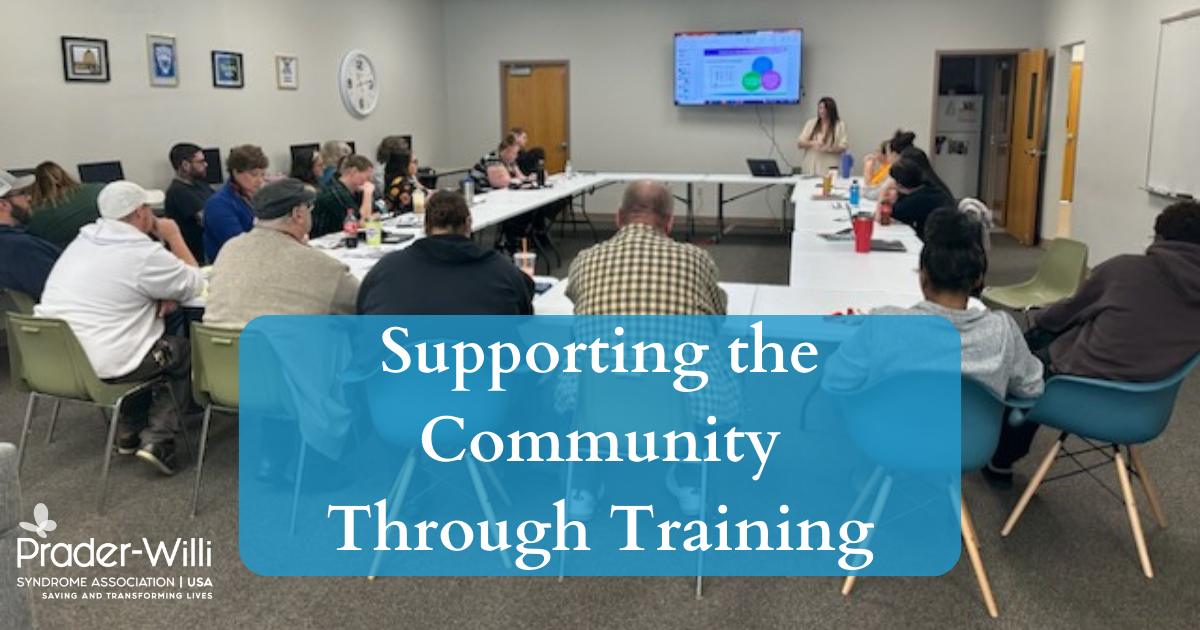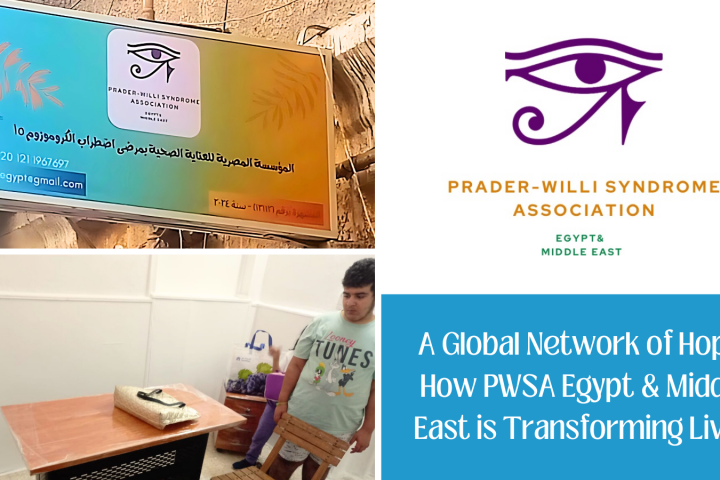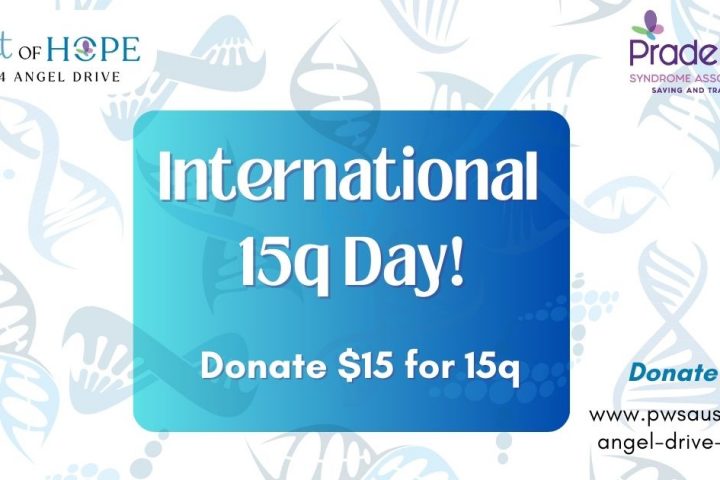Contributed by Kim Tula
PWSA | USA supports the PWS community in a multitude of ways. This includes providing training to residential home and school staff. These trainings are an essential component of educating schools, homes, and providers to help our loved ones live safer, healthier lives. Kim Tula is our Alterman Family Support Counselor. She has recently traveled to a number of places to provide these trainings. We asked her to share details about her work in the community.
What types of training does PWSA | USA offer, and who receives this?
We offer training for schools and residential providers who need guidance or increased knowledge to support individuals with Prader-Willi syndrome. When it comes to school training, we focus on the complexities of PWS and how they can impact the student’s ability to learn, the need for food security, and common behaviors with a focus on positive behavior support. We also review IEPs and behavior plans. School trainings are often attended by all school staff working with the student with PWS. However, some school districts have chosen to open the training to all staff within the school district.
The training for residential providers is focused on many different areas, including the genetics and medical overview of PWS, supporting someone with PWS, common behaviors and approaches to behavior management, dignity and respect, activity planning, food security, diet and nutrition, and working with families. The residential trainings are often requested by agencies looking to start serving individuals with PWS and agencies that are struggling with supporting individual(s) with PWS or who need refreshers on supporting individuals with PWS. More recently, county agencies have requested residential training, as they are looking to increase the number of PWS providers in their county/state. Those who attend the residential training vary from direct care staff to administration, county workers, social workers, police, and medical staff.
I also recently provided three days of training for all supervisory staff at a hospital located near a growing agency with a few PWS-specific group homes.
What have the trainings meant to the people receiving them?
According to feedback I receive during and after a training, many express that the trainings are eye-opening and give them a clearer understanding of PWS and its complexities. School staff often say the training has helped them see why general teaching approaches might not be working. Some express that they now feel better prepared to support their student(s). Residential providers often say they have a better understanding and are excited to try new approaches to support the individuals they serve. Newer agencies have also been able to expand into serving those with PWS, providing much-needed residential support.
In a recent training with hospital staff, the nurses expressed that the information would help them to care for the patients better and to understand how PWS is so different from other disabilities. One nurse was particularly thankful, stating her daughter has a rare genetic disorder, and having the hospital educated on PWS gave her hope.
What are some of the training impact stats?
Schools often request yearly training to ensure new teachers and staff are trained to support the child with PWS when he/she changes grades or schools. Residential providers continue to reach out for help after trainings, and some schedule refreshers or record the training to use as refreshers. I can tell you that I have trained four new providers, (in the past two years) who are now supporting individuals with PWS.
How can people reach out to get trainings in the future?
People can either call our main number at (941) 312-0400) or email our info email (info@pwsausa.org) with requests for training. It’s not uncommon for families to reach out about training and then loop in the school or provider.
How does the PWS community benefit?
The PWS community benefits by ensuring those with PWS are receiving support and care that helps them thrive. Families can have a sense of comfort knowing that their loved one’s teacher or provider understands the complexities of PWS and the need for food security, along with the understanding that not all individuals with PWS are the same; this is a spectrum disorder, and each person is an individual living with PWS. We stress the importance of recognizing the individual and their strengths, not just their syndrome. The community also benefits because these trainings can raise awareness about PWS.
A Few Testimonials:
“Your training was incredibly impactful for our staff and those who joined us. People have been writing to let me know how much they enjoyed it. It was really powerful for us. Thank you. It far exceeded our expectations-you were stellar to say the least. Great job and thank you.”
“I’m really looking forward to continuing to work with you. You have given all of us a sense of safety in this unchartered territory we’re in, and we all feel so grateful you’re on the journey with us.”
Share this!





 Jennifer Bolander has been serving as a Special Education Specialist for PWSA (USA) since October of 2015. She is a graduate of John Carroll University and lives in Ohio with her husband Brad and daughters Kate (17), and Sophia (13) who was born with PWS.
Jennifer Bolander has been serving as a Special Education Specialist for PWSA (USA) since October of 2015. She is a graduate of John Carroll University and lives in Ohio with her husband Brad and daughters Kate (17), and Sophia (13) who was born with PWS. Perry A. Zirkel has written more than 1,500 publications on various aspects of school law, with an emphasis on legal issues in special education. He writes a regular column for NAESP’s Principal magazine and NASP’s Communiqué newsletter, and he did so previously for Phi Delta Kappan and Teaching Exceptional Children.
Perry A. Zirkel has written more than 1,500 publications on various aspects of school law, with an emphasis on legal issues in special education. He writes a regular column for NAESP’s Principal magazine and NASP’s Communiqué newsletter, and he did so previously for Phi Delta Kappan and Teaching Exceptional Children. Evan has worked with the Prader-Willi Syndrome Association (USA) since 2007 primarily as a Crisis Intervention and Family Support Counselor. Evans works with parents and schools to foster strong collaborative relationships and appropriate educational environments for students with PWS.
Evan has worked with the Prader-Willi Syndrome Association (USA) since 2007 primarily as a Crisis Intervention and Family Support Counselor. Evans works with parents and schools to foster strong collaborative relationships and appropriate educational environments for students with PWS. Dr. Amy McTighe is the PWS Program Manager and Inpatient Teacher at the Center for Prader-Willi Syndrome at the Children’s Institute of Pittsburgh. She graduated from Duquesne University receiving her Bachelor’s and Master’s degree in Education with a focus on elementary education, special education, and language arts.
Dr. Amy McTighe is the PWS Program Manager and Inpatient Teacher at the Center for Prader-Willi Syndrome at the Children’s Institute of Pittsburgh. She graduated from Duquesne University receiving her Bachelor’s and Master’s degree in Education with a focus on elementary education, special education, and language arts. Staci Zimmerman works for Prader-Willi Syndrome Association of Colorado as an Individualized Education Program (IEP) consultant. Staci collaborates with the PWS multi-disciplinary clinic at the Children’s Hospital in Denver supporting families and school districts around the United States with their child’s Individual Educational Plan.
Staci Zimmerman works for Prader-Willi Syndrome Association of Colorado as an Individualized Education Program (IEP) consultant. Staci collaborates with the PWS multi-disciplinary clinic at the Children’s Hospital in Denver supporting families and school districts around the United States with their child’s Individual Educational Plan. Founded in 2001, SDLC is a non-profit legal services organization dedicated to protecting and advancing the legal rights of people with disabilities throughout the South. It partners with the Southern Poverty Law Center, Protection and Advocacy (P&A) programs, Legal Services Corporations (LSC) and disability organizations on major, systemic disability rights issues involving the Individuals with Disabilities Education Act (IDEA), Americans with Disabilities Act (ADA), and the federal Medicaid Act. Recently in November 2014, Jim retired.
Founded in 2001, SDLC is a non-profit legal services organization dedicated to protecting and advancing the legal rights of people with disabilities throughout the South. It partners with the Southern Poverty Law Center, Protection and Advocacy (P&A) programs, Legal Services Corporations (LSC) and disability organizations on major, systemic disability rights issues involving the Individuals with Disabilities Education Act (IDEA), Americans with Disabilities Act (ADA), and the federal Medicaid Act. Recently in November 2014, Jim retired.